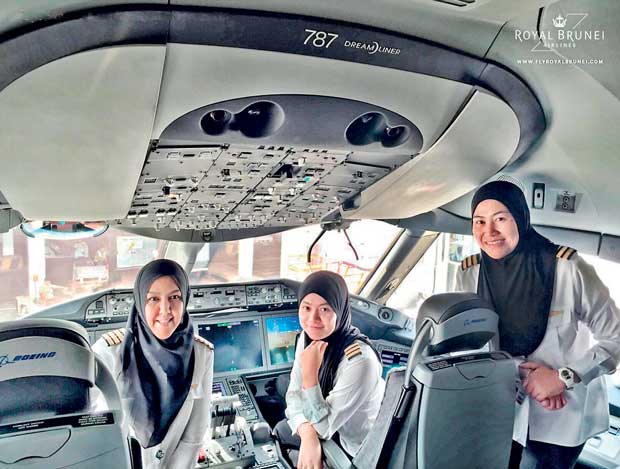Reply To:
Name - Reply Comment
 Captain Sharifah Czarena Surainy, Senior First Officers Dk Nadiah Pg Khashiem and Sariana Nordin
Captain Sharifah Czarena Surainy, Senior First Officers Dk Nadiah Pg Khashiem and Sariana Nordin
We live in fascinating times. 
On the one hand, we are appalled by the treatment of women and children (and of course men) by the Islamic State of Iraq and Syria (ISIS), which has somehow succeeded in emerging as a ruthless alternate to the parochial rule of the Middle East. Why and how such actions are tolerated in the civil world is one beyond the comprehension of average folk like you and me. The ISIS treats women as objects to be used, discarded and killed, often in one sentence.
Apart from the ISIS, things are no better for women throughout the Middle East, more so in Saudi Arabia where women still are not permitted to drive. Recently, it was announced that unless segregated, women could not enter Starbucks either. Women in Saudi Arabia still cannot go anywhere alone and must be chaperoned at all times, cannot interact with men in public and cannot wear makeup or fashionable garments that show off their beauty. They cannot use swimming pools that are not segregated and cannot try on clothes in a shop. They can participate in sports wearing Sharia compliant clothing but must be accompanied by a male.
Of course, things have been better for women in Iraq and Syria, although both countries now are facing political chaos. Both countries have had successful women engaged in many professions. Women’s rights came much early to Syrian women – Syria was one of the first Arab countries to allow women to vote and enjoy legal rights. Women in Jordan also enjoy rights as personified by the country’s fashionable Queen Rania.
Yet, into this closed world where gender equality is not a priority for the majority, a new normal is struck by the women themselves. They want to test the waters – they want to – slowly but surely – take back what is due to them and makes them part of the world they live in. A while ago, a group of Saudi women protested by choosing to drive on their own – knowing full well that they would face consequences. Yet, the defiant action garnered tremendous media attention globally and highlighted the issue even further.
Women made history of a different kind in Saudi Arabia this year when an all-female flight crew from the equally conservative Brunei landed a plane there. The women-only flight deck of Royal Brunei Airlines came in for praise in February this year when they landed their aircraft in a country that still does not allow its women to drive cars, leave alone man a plane – Saudi Arabia.
Captain Sharifah Czarena Surainy, Senior First Officers Dk Nadiah Pg Khashiem and Sariana Nordin operated the 10-and-a-half hour flight from Brunei to Jeddah, Saudi Arabia. What might seem like a standard, normal flight to the rest of the world, it was in reality a triumph of sorts for the women in a region that doesn’t permit them to do much.
“People normally see piloting as a male dominant occupation,” Surainy told media in 2012. “For me, as a Bruneian woman, it is a significant achievement and is symbolic. It encourages the younger girls to aspire to a career and achieve their dreams.”
Surainy is used to breaking barriers – she was the first woman to fly a flag carrier in Southeast Asia in 2012 and succeeded in setting the stage as a pioneer for others to follow.
Recognising women’s rights, it seems, forms an integral part of her company’s culture that encourages women to apply for engineering apprenticeship via social media outreach. “Who says engineering is a men’s only profession?” was the caption of the Royal Brunei Airlines Instagram account with a magnificent picture of their women engineers. Each of them would have had to overcome many challenges in achieving their dream. What about others? Would everyone have access to same opportunities in a culture that does not reward female high achievers as often as they should?
In the same context, what’s special about this feat of three women who would have had to endure much to get to where they are. What stands out about a gesture that may seem insignificant by today’s standards of gender equality?
The whole message of an all-female crew piloting an aircraft in a symbolic one, as much as one that speaks volumes for the capabilities of women, no matter where they are. They are talented and keen to learn, able and equipped to cross boundaries as women everywhere else are. They delivered a powerful message with their gesture – that they can cross barriers and stand on their own two feet and that time has indeed come for that, notwithstanding cultural and religious taboos.
(Nayomini Weerasooriya, a senior journalist, writer and a PR professional, can be contacted at [email protected])